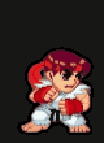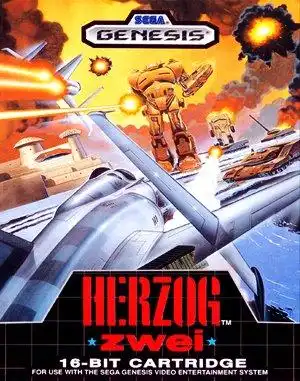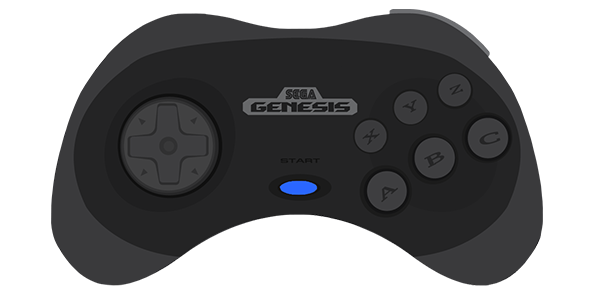Forget what you thought you knew about early 16-bit gaming. While the Sega Genesis pumped out countless arcade ports and platformers, tucked away in its early library was a title that truly broke the mold: Herzog Zwei. This wasn't just another game; it was a glimpse into the future of strategy gaming, blending action, resource management, and tactical command in a way few games had before, especially on a console.
Often cited as a foundational precursor to both the Real-Time Strategy (RTS) and Multiplayer Online Battle Arena (MOBA) genres, Herzog Zwei was arguably ahead of its time. Its unique approach to commanding units directly influenced titles that would later define PC gaming for decades.
What Made Herzog Zwei So Different?
Unlike traditional strategy games where you might click on units from a top-down map, Herzog Zwei put you directly into the action. You control a transforming mech, capable of flying like a jet or walking on the ground. This mech isn't just a powerful unit; it's your only way to interact with and command your army.
Think of it as being the ultimate general, but you have to personally fly/walk around the map, pick up units, transport them, drop them off, and issue commands face-to-face (well, mech-to-unit). It's a hands-on, high-stakes form of command that feels incredibly dynamic.
Gameplay: Commanding the Battlefield from Your Mech
The core loop of Herzog Zwei revolves around capturing and defending neutral bases scattered across the map. These outposts are vital because:
- They generate income, which you need to buy more units.
- They serve as repair and refueling stations for your mech and supply vehicles.
- You purchase new units directly from your main base or captured outposts.
Managing your resources – money, your mech's fuel and ammo, and your units' status – is paramount. Leaving a supply vehicle vulnerable or running out of fuel over enemy territory is a quick way to lose ground (or your mech!).
Commanding units isn't just about dropping them off. You can assign them specific orders via a menu, such as:
- Patrol a route
- Attack specific targets
- Capture an outpost
- Guard a location
Mastering the flow of picking up units, transporting them to the front lines or key outposts, issuing orders, and managing your own mech's needs is the heart of the game. It requires constant attention and strategic thinking, making it a genuinely demanding experience.
Ahead of Its Time: Herzog Zwei's Legacy
While it wasn't a massive commercial hit upon release, Herzog Zwei's influence slowly but surely permeated the industry. Its real-time resource management, base capturing, and direct unit command via a central player unit laid groundwork that would be built upon by later groundbreaking titles.
Many developers behind iconic RTS games like Dune II, Warcraft, and Command & Conquer have pointed to Herzog Zwei as an inspiration. The concept of a powerful, persistent command unit also echoes in the hero units of later RTS games and, more directly, the player-controlled champions in the MOBA genre. It's no exaggeration to say that elements of games like League of Legends or Dota 2 can trace a lineage back to this humble Genesis title.
The Challenge and the Reward
Herzog Zwei is notorious for its difficulty, especially in single-player against the AI. The computer opponent often feels brutally efficient, able to deploy units with uncanny speed. However, this steep learning curve is also part of its charm. Overcoming the AI through careful strategy and efficient execution is incredibly rewarding.
The game truly shines in its two-player split-screen mode. Facing off against a human opponent who is grappling with the same micromanagement demands creates tense, strategic battles that were unmatched on consoles for years.
Playing Herzog Zwei Today
Good news, retro fans! You don't necessarily need to track down an old Genesis and cartridge (though that's always an option!). Herzog Zwei has seen modern re-releases, making it accessible to a new generation:
- Sega Ages for Nintendo Switch: This excellent port includes quality-of-life features like an interactive tutorial, online multiplayer, widescreen support, and save states. It's arguably the best way to experience the game today.
- Sega Genesis Mini 2: The game was also included as one of the many classic games on the second iteration of Sega's miniature console.
These modern releases are a testament to the game's lasting impact and playability.
Why Herzog Zwei Still Matters
Herzog Zwei is more than just a curiosity for gaming historians. It's a genuinely innovative and engaging game that dared to be different on a console dominated by other genres. Its unique blend of action and strategy, its demanding gameplay, and its undeniable influence on entire genres solidify its place as a true classic. If you're a fan of strategy games or simply appreciate titles that pushed boundaries, Herzog Zwei is absolutely worth revisiting.
Herzog Zwei FAQ
Q: What genre is Herzog Zwei? A: Herzog Zwei is considered a very early example of a Real-Time Strategy (RTS) game, often seen as a precursor to modern RTS and even MOBA games due to its unique command unit and real-time resource management.
Q: Why is Herzog Zwei considered historically important? A: It pioneered key mechanics like real-time resource collection, base capturing for expansion, and direct command of units via a player-controlled vehicle, influencing later genre-defining games like Dune II, Warcraft, and Command & Conquer.
Q: Is Herzog Zwei difficult? A: Yes, it's known for a steep learning curve and a challenging AI opponent, especially in single-player. Mastering the game's micromanagement and strategy takes time and practice.
Q: Can I play Herzog Zwei on modern systems? A: Absolutely! It's available digitally as part of the Sega Ages collection on Nintendo Switch and is also included on the Sega Genesis Mini 2 console.


